

9 Reasons Apartments Can Deny Emotional Support Animals
by Lena Park
Last updated: September 16, 2025
Verified and Approved by:
Angela Morris,
MSW, LCSW
Fact Checked

Overview
The article thoughtfully explores why apartments may deny emotional support animals (ESAs), addressing several valid concerns that can lead to such decisions. These include:
- Insufficient documentation
- Potential threats posed by the animal
- Property damage
- Worries about the size or breed of the animal
It’s important to recognize that while the Fair Housing Act safeguards tenants’ rights to have ESAs, landlords are permitted to refuse requests based on legitimate safety and property management issues. This underscores the significance of having proper documentation and fostering open communication between tenants and landlords.
For individuals facing mental health challenges, the struggle to secure an ESA can feel overwhelming. The emotional support that these animals provide is invaluable, yet navigating the complexities of housing regulations can add to the stress. It’s crucial to understand that the right documentation can make a significant difference in these situations, offering a pathway to ensure that the support you need is recognized and respected. By engaging in compassionate dialogue with landlords and presenting valid ESA letters, tenants can advocate for their needs while also addressing any concerns that may arise.
Ultimately, the journey towards securing an ESA is about more than just compliance; it’s about finding the support that nurtures your well-being. Remember, you are not alone in this process, and there are resources available to help you navigate these challenges with confidence and care.
Introduction
Navigating the world of emotional support animals (ESAs) can be a challenging journey for many tenants, especially when they face the possibility of denial from landlords. While the Fair Housing Act offers essential protections, it’s important to recognize that there are valid reasons why some apartments may refuse to allow these vital companions. This article explores the intricacies of ESA acceptance, shedding light on what tenants need to know about their rights, the necessary documentation, and the common justifications landlords might use to deny requests.
As the emotional well-being of many depends on the presence of their ESAs, understanding these factors is crucial. What challenges might arise for those seeking the comfort of their furry friends in rental properties? Your journey matters, and support is available to help you navigate these complexities.
Wellness Wag: Streamlined ESA Letter Services for Tenants
At Wellness Wag, we understand the emotional challenges that individuals with mental health issues often face. The journey toward emotional well-being can be overwhelming, and for many, the companionship of a pet can provide essential support. However, obtaining the necessary documentation for an Emotional Support Animal (ESA) can feel daunting. That’s where we come in, offering a streamlined and user-friendly platform to help you secure your ESA letter quickly and efficiently.
The process begins with a short evaluation designed to assess your eligibility based on your unique emotional assistance needs. After you submit the required forms, we connect you with licensed medical professionals who will provide personalized consultations and thorough evaluations. Our goal is to ensure that you feel supported every step of the way.
Once approved, you can expect to receive your official ESA letter within 30 days after authorization. This letter is not just a piece of paper; it empowers you to assert your rights under housing laws, including protections provided by the Fair Housing Act (FHA) and the Air Carrier Access Act (ACAA). We recognize how vital this swift turnaround is for individuals facing mental health difficulties, as it allows you to obtain the emotional support you need from your beloved pets without unnecessary delays.
Experts emphasize that timely access to valid ESA documentation is crucial for addressing questions about how can apartments deny emotional support animals. This is why Wellness Wag is committed to being a reliable choice for those seeking immediate assistance. We also offer a money-back guarantee, reinforcing the legitimacy and reliability of our services, so you can feel confident in your decision.
We invite you to reflect on your own experiences and consider how an ESA could enhance your emotional well-being. At Wellness Wag, we are here to support you on this journey, ensuring you have the resources you need to thrive.
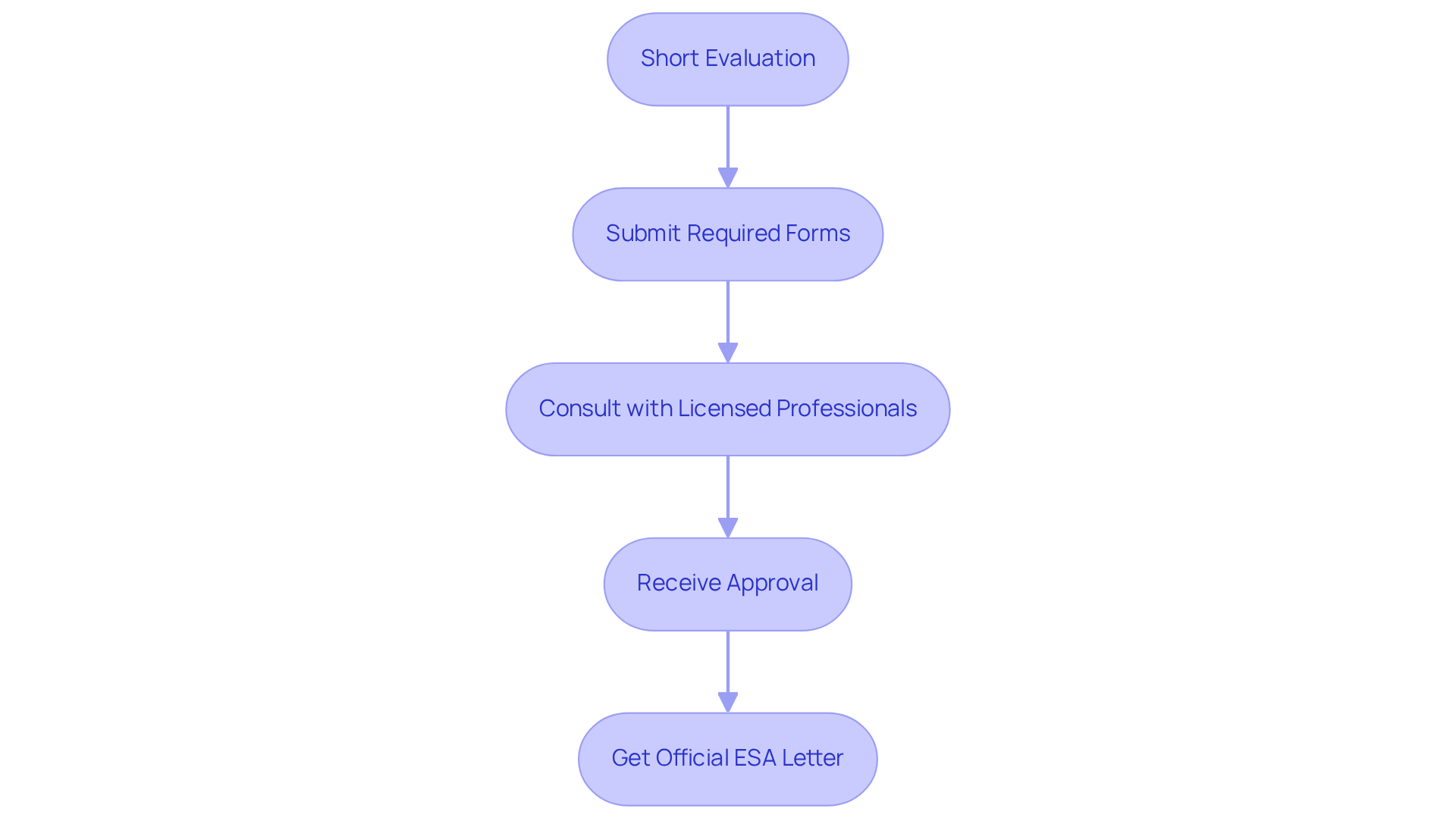
Legal Rights of Tenants with Emotional Support Animals
Under the Fair Housing Act (FHA), individuals with emotional assistance animals (ESAs) are granted specific rights that protect them from discrimination. This is especially important for those facing emotional challenges, as having an ESA can provide much-needed comfort and support.
Unlike service dogs, which are trained to perform specific tasks and enjoy broader legal access under the ADA, ESAs focus on offering emotional relief. It’s crucial to understand that while some may wonder if apartments can deny emotional support animals, landlords cannot deny housing based on a resident’s need for an ESA, even in properties with ‘no pets’ policies. This means that you can live with your ESA without fear of rejection.
Furthermore, property owners are not permitted to impose fees or deposits for ESAs, ensuring that you can reside with your assistance animal without added financial strain. Knowing these rights empowers renters to communicate effectively with their landlords and navigate their living situations with confidence and peace of mind.
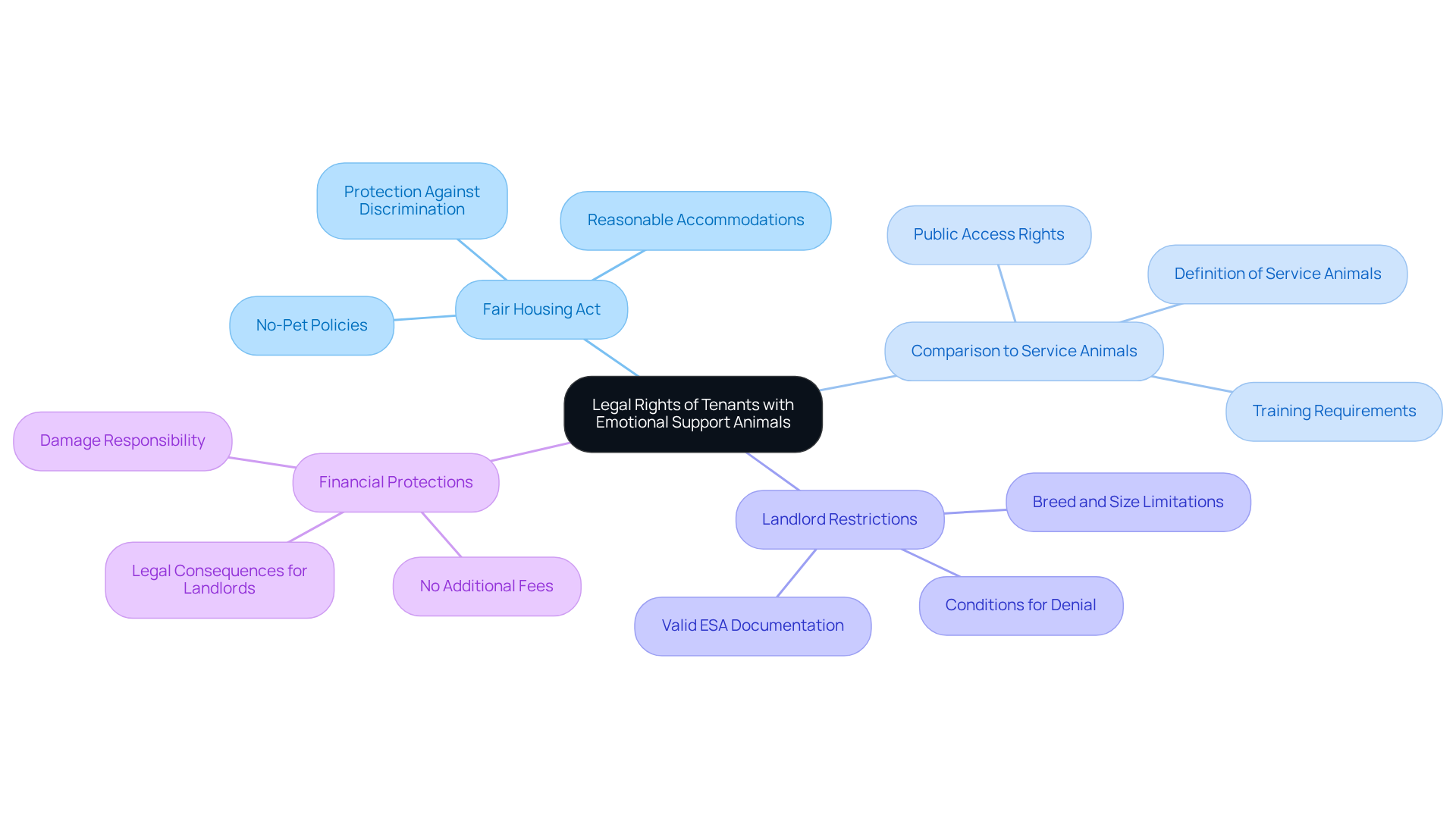
Valid Reasons for Apartment Denial of Emotional Support Animals
The Fair Housing Act (FHA) aims to protect residents who rely on emotional support animals (ESAs) for their mental well-being. However, it’s important to recognize that landlords may still have valid reasons when they ask, can apartments deny emotional support animals? Understanding these reasons can help you navigate this sensitive process with care.
One common issue is insufficient documentation. Without a valid ESA letter from a licensed healthcare professional, your request may be denied. This documentation is crucial, as it outlines why your ESA is necessary for your mental health.
Another concern is direct threats. If your ESA poses a direct threat to the safety or health of others, landlords may refuse your request. This includes any documented aggressive behavior or other safety-related issues.
Property damage is also a significant factor. If your ESA causes substantial damage, landlords may have grounds to deny the request. They have a responsibility to maintain their properties and ensure the safety of all residents.
Lastly, there’s the consideration of inappropriate size or breed. While the FHA prohibits discrimination based on these factors, landlords might still argue that certain animals are not suitable for specific living environments, particularly in smaller spaces.
As a tenant, it’s essential to gather all necessary documentation proactively and be ready to address any concerns your landlord may raise. By understanding these factors, you can better navigate the complexities of ESA requests and advocate for your rights, especially considering that can apartments deny emotional support animals. Remember, you are not alone in this journey, and support is available to help you along the way.
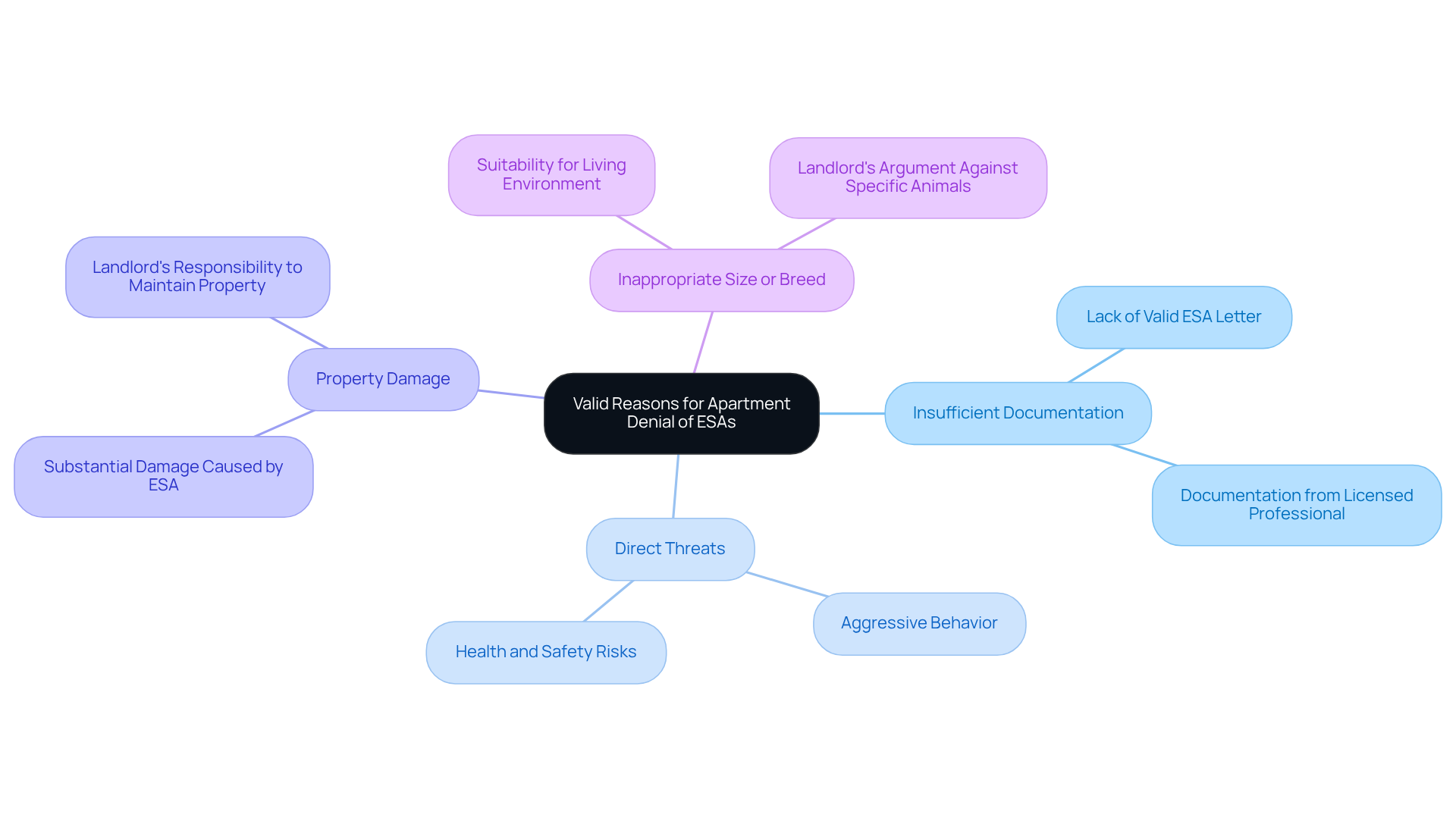
Types of Animals Recognized as Emotional Support Animals
Emotional assistance creatures encompass a diverse array of domesticated species, extending beyond the familiar choices of dogs and cats. Among the common emotional support creatures are:
- rabbits
- guinea pigs
- birds
- even miniature horses
The primary criterion for a creature to qualify as an ESA is its ability to provide comfort and alleviate symptoms associated with mental health conditions. Many veterinarians note that smaller creatures, such as rabbits and guinea pigs, are often favored in apartment settings due to their manageable size and lower maintenance needs.
It’s essential to understand that emotional assistance creatures are not required to undergo specialized training under Florida or federal law, which sets them apart from service animals. Under the Fair Housing Act (FHA), individuals with an ESA letter are entitled to live with their emotional support companion in on-campus housing without incurring penalties or additional fees, regardless of whether apartments can deny emotional support animals due to a no-pet policy. This means that while apartments can deny emotional support animals, property owners cannot impose extra charges or pet deposits for having an ESA, although residents remain responsible for any damage caused by their pet. Tenants must ensure that their chosen pet is well-behaved and suitable for apartment living to prevent potential conflicts with landlords. Furthermore, tenants are responsible for managing their emotional assistance creatures at all times, as neglecting to do so could lead to issues with housing providers. Misrepresenting an animal as an ESA can also result in significant penalties, underscoring the importance of accurate documentation. Ultimately, the suitability of an ESA is determined by its ability to nurture emotional well-being while respecting the constraints of the living environment.
With the support of licensed professionals at Wellness Wag, acquiring a legitimate ESA letter can be a straightforward process, ensuring that clients receive the necessary documentation to exercise their rights under the FHA. As one satisfied client shared, “Thanks to Wellness Wag, I received approval for my ESA quickly and without any difficulties. Their staff is friendly and caring.” This testimony reflects Wellness Wag’s commitment to providing a seamless experience for those seeking emotional assistance through their beloved pets.
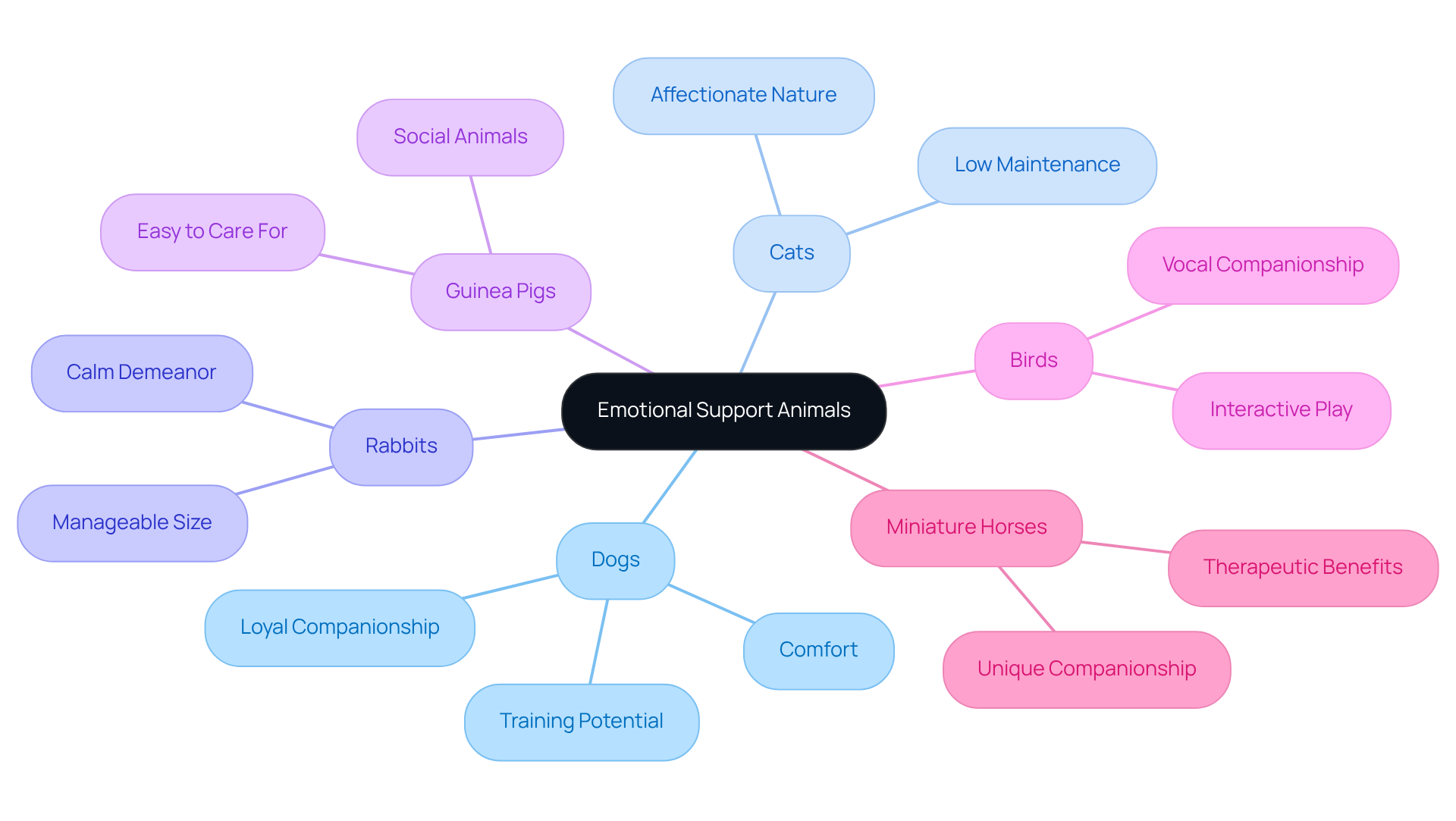
Importance of ESA Registration and Documentation
For those navigating the challenges of mental health, proper registration and documentation are crucial when it comes to living with emotional support animals (ESAs). It’s vital to safeguard your rights by obtaining a valid ESA letter from a certified mental health professional. This letter not only outlines the necessity of the animal as part of your treatment plan but also serves as essential proof of your right to have the ESA in your home, especially in light of the question of whether can apartments deny emotional support animals, protecting you from potential discrimination by landlords.
While ESAs provide emotional support, it’s important to understand that they are distinct from service dogs, which are specifically trained to perform tasks for individuals with disabilities. Keeping a copy of this documentation readily available is essential during interactions with landlords, as it reinforces your legal protections under the Fair Housing Act.
The process of acquiring an emotional support animal letter typically takes about six weeks, so starting this journey promptly is important for your peace of mind. To manage your ESA documentation effectively, consider organizing your letters and any related correspondence, and be prepared to explain your rights, especially regarding how can apartments deny emotional support animals if questioned by a landlord.
With the growing demand for ESAs, securing a valid letter is crucial, as it directly influences your ability to find housing without facing unnecessary restrictions. Remember, you are not alone in this journey; support is available to help you navigate these challenges.
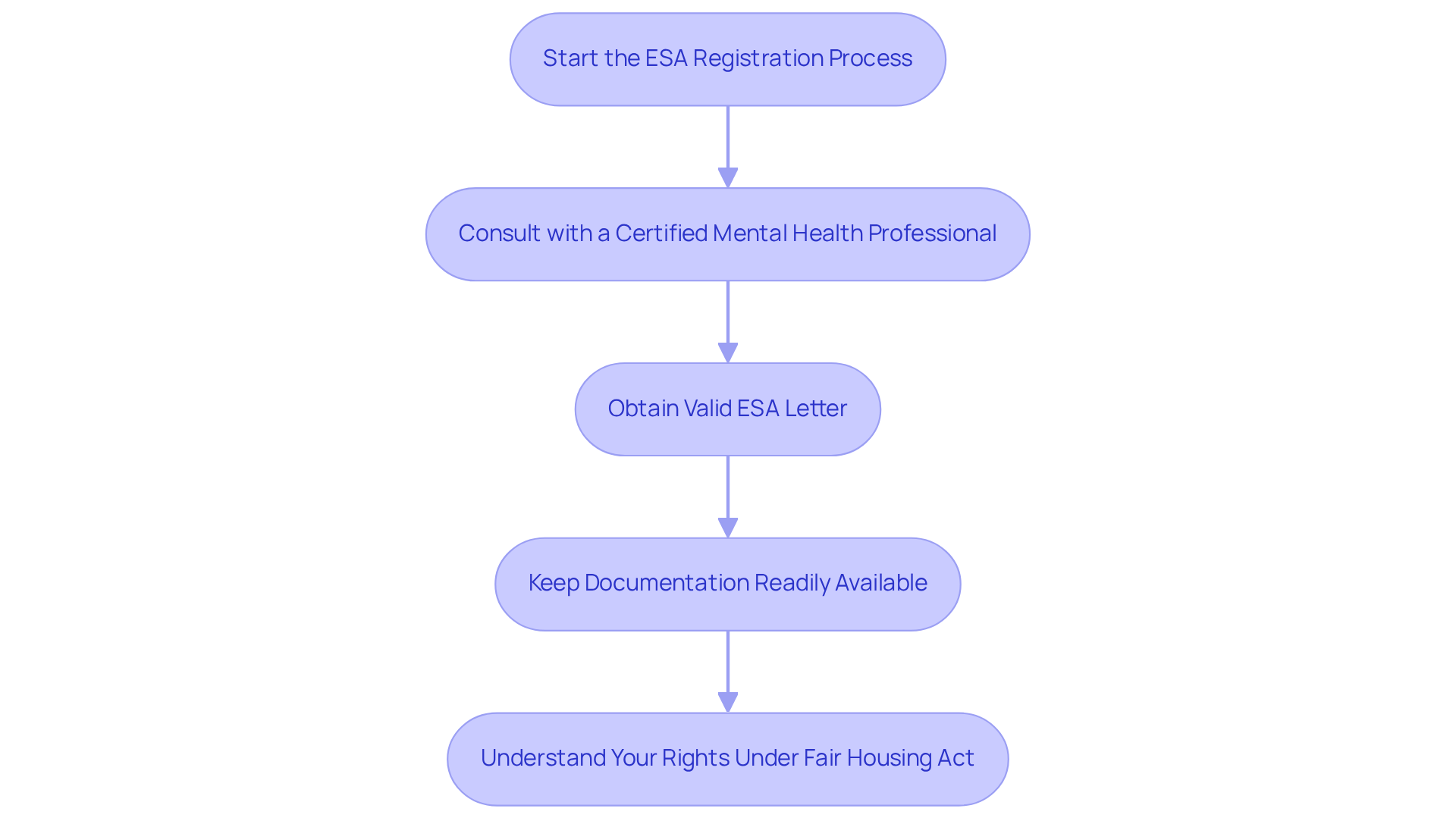
Consequences of Denial for Tenants with ESAs
Refusing an individual’s request for an emotional support animal can lead to profound emotional distress, raising the question of whether apartments can deny emotional support animals. Without their ESA, many experience heightened anxiety, depression, and other mental health challenges, worsening their conditions. The journey to assert their rights under the Fair Housing Act (FHA) can be overwhelming, often resulting in legal battles that are both time-consuming and emotionally draining.
Imagine navigating complex legal frameworks to challenge a denial, all while trying to manage your mental well-being. Licensed experts at Wellness Wag, including Dr. Tasha Holland-Kornegay, emphasize that the absence of an ESA can significantly impact emotional stability, as these animals provide essential companionship and support.
According to the U.S. Department of Housing and Urban Development (HUD), while landlords must offer reasonable accommodations for residents with ESAs, it raises the question of whether apartments can deny emotional support animals if the animal poses a direct threat to health or safety. Understanding these rights is crucial for renters, especially when considering whether apartments can deny emotional support animals; seeking legal advice can empower them to address unjust refusals effectively.
The emotional toll of losing an ESA underscores the importance of these companions in tackling mental health challenges. Wellness Wag offers a step-by-step guide to obtaining valid ESA letters, tailored to meet state-specific requirements, ensuring tenants receive the necessary support in this process. Testimonials from clients highlight the transformative impact of having an ESA, reinforcing the vital role these animals play in enhancing emotional well-being.
Have you ever considered how an ESA could change your life for the better?
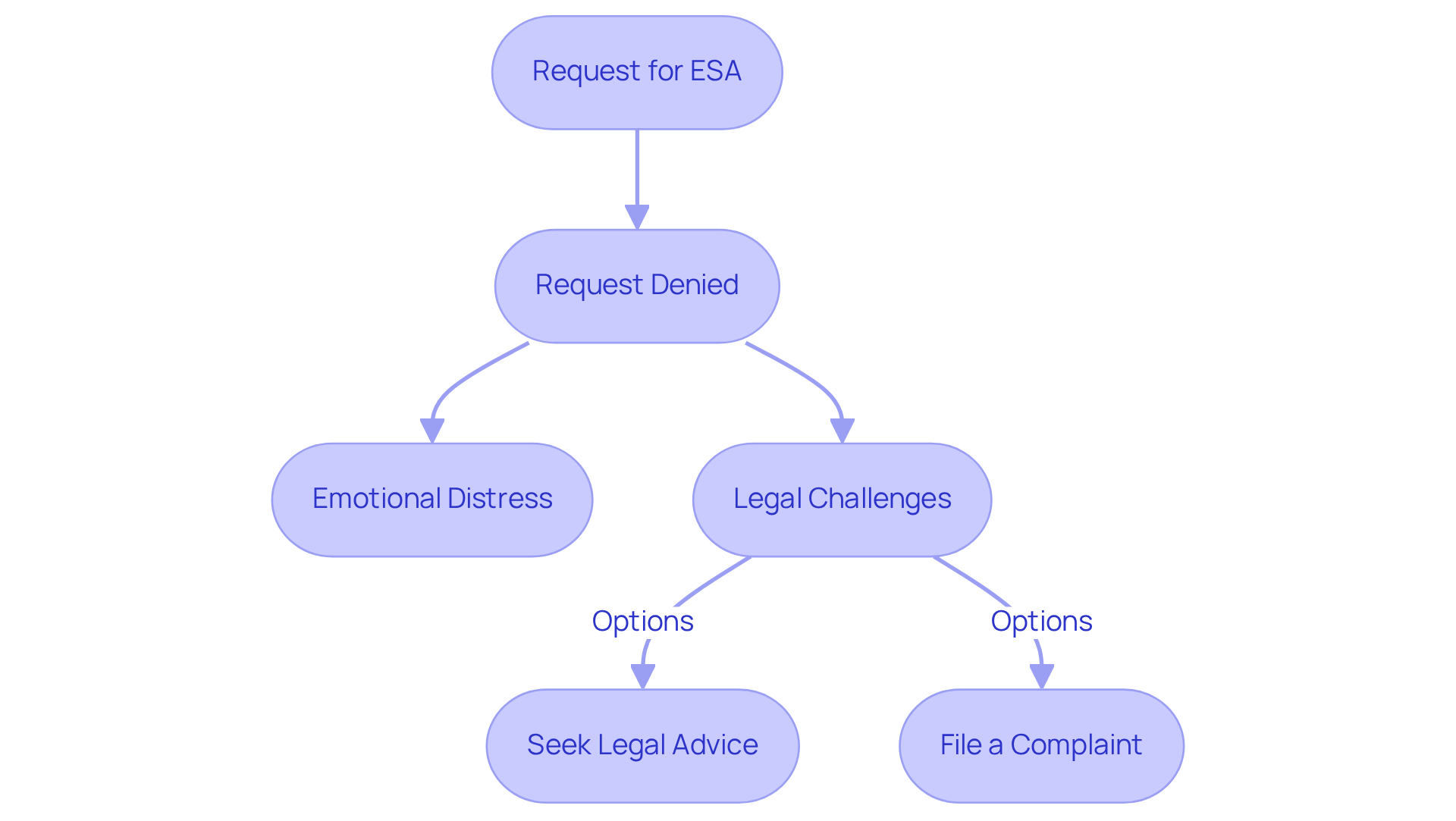
Landlord Insurance Considerations Regarding Emotional Support Animals
Landlords are encouraged to thoughtfully assess their insurance policies when accommodating emotional support animals (ESAs). While it is important to note that they cannot require tenants to obtain separate liability insurance for their ESAs, it remains essential for landlords to verify that their current policies adequately cover potential damages caused by these beloved companions.
ESAs provide emotional comfort and support to individuals grappling with psychological or emotional disorders, yet they differ from service dogs in that they are not trained to perform specific tasks. With the rise in liability claims involving emotional support animals, it is vital for landlords to comprehend their coverage limits.
Insurance professionals recommend that landlords proactively review their policies and consult with their providers to clarify any implications of allowing ESAs on their properties. This proactive approach not only safeguards property owners from potential financial losses but also fosters a more inclusive environment for residents who rely on the emotional companionship that their pets provide.
By taking these steps, landlords can create a nurturing space that acknowledges the importance of emotional support in the lives of their tenants.
Tenant-Landlord Interactions Concerning ESAs
Effective communication plays a vital role when individuals seek to have an emotional support animal (ESA). Many people face emotional challenges that can feel overwhelming, and it’s essential to approach this situation with compassion. Tenants should begin discussions with their landlords equipped with clear documentation, including a legitimate ESA letter from a licensed mental health professional. This letter serves as a crucial support tool, validating the need for an ESA in managing mental health difficulties.
Approaching the conversation with respect and understanding can significantly influence the outcome. It’s beneficial for residents to articulate their specific needs for the ESA and explain how it assists them in navigating their mental health challenges. This not only helps landlords understand the importance of the ESA but also fosters a sense of connection between both parties.
Landlords, in turn, should remain open to dialogue and consider reasonable accommodations. By doing so, they can create a cooperative relationship that enhances tenant satisfaction. This collaborative approach not only supports tenants in their emotional journeys but also helps landlords fulfill their responsibilities under the Fair Housing Act. Together, both parties can work towards a mutually beneficial agreement, ensuring that individuals feel supported and understood in their need for an ESA.
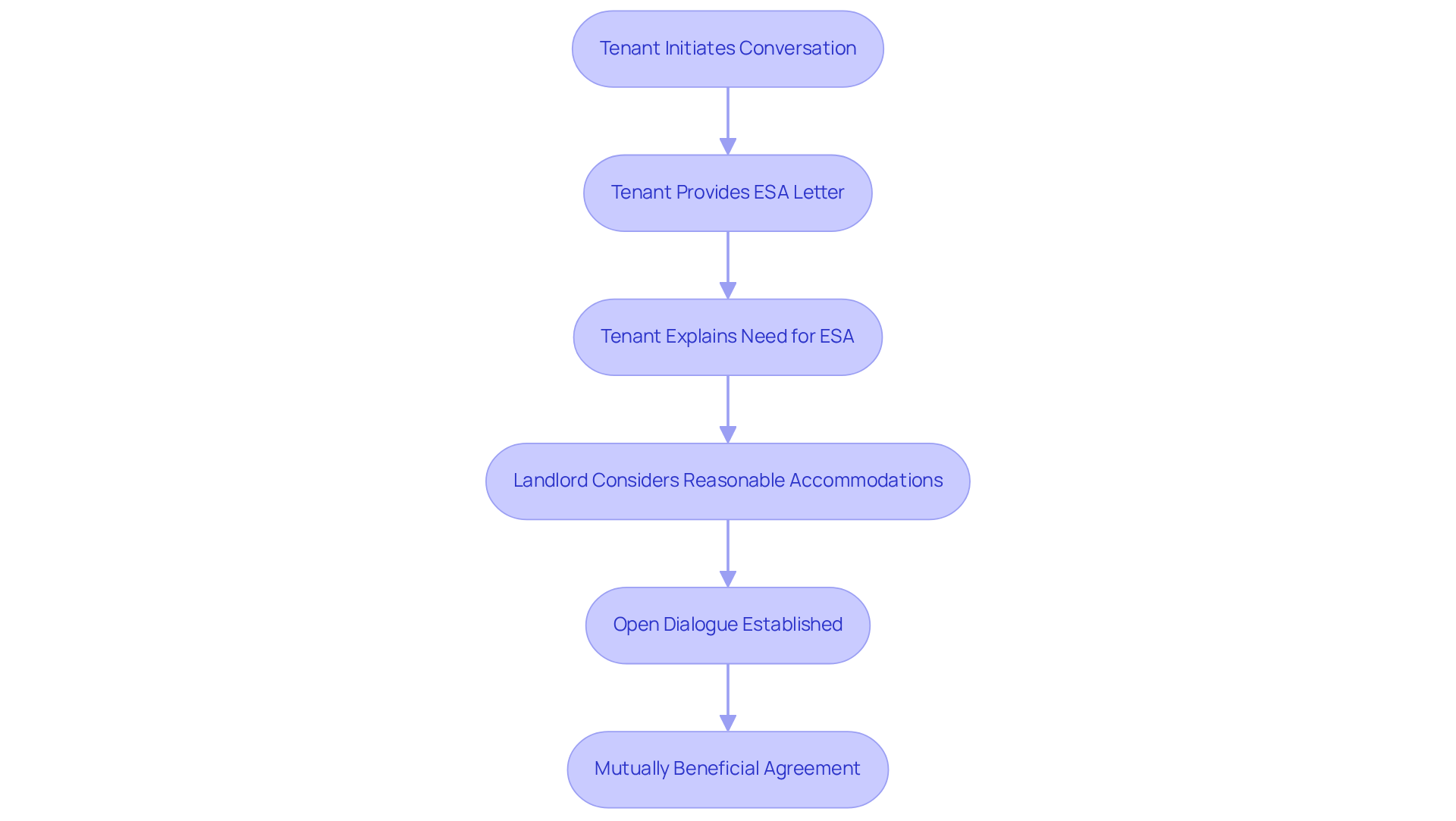
Local Laws Affecting ESA Acceptance in Apartments
Local regulations can significantly impact whether apartments can deny emotional support animals (ESAs), and understanding these rules is essential for those seeking comfort through their companions. The Fair Housing Act (FHA) requires housing providers to accommodate emotional support animals, but it raises the question of whether apartments can deny emotional support animals due to additional regulations set by individual states and municipalities that may support or limit these rights. For instance, in states like California and Florida, a 30-day therapeutic relationship with a licensed mental health professional is necessary before issuing ESA letters. This requirement helps ensure the legitimacy of the documentation, ultimately protecting individuals from potential fraud.
Moreover, it’s important to know that landlords cannot charge pet fees or enforce breed restrictions on ESAs unless the creature poses a clear threat to health or safety, aligning with the FHA’s mandate for reasonable accommodations. However, some states, such as Alabama and Texas, impose penalties for misrepresenting a creature as an ESA. This underscores the importance of obtaining a valid ESA letter from a licensed professional, ensuring that your emotional support companion is recognized and protected.
Legal professionals often stress the importance of being aware of both federal and state-specific regulations. For example, in Pennsylvania, while discussing whether apartments can deny emotional support animals, landlords cannot deny ESAs if the owner has a valid ESA letter, even in no-pet policies. Conversely, states like Wisconsin may have breed-specific legislation that complicates the acceptance of certain species, despite the protections offered by the FHA. It’s crucial for tenants to thoroughly research local laws regarding whether apartments can deny emotional support animals, as this knowledge empowers them to navigate potential challenges and secure the necessary arrangements for their emotional assistance creatures. Remember, you are not alone in this journey; understanding your rights can provide peace of mind and support as you seek the companionship that brings you comfort.
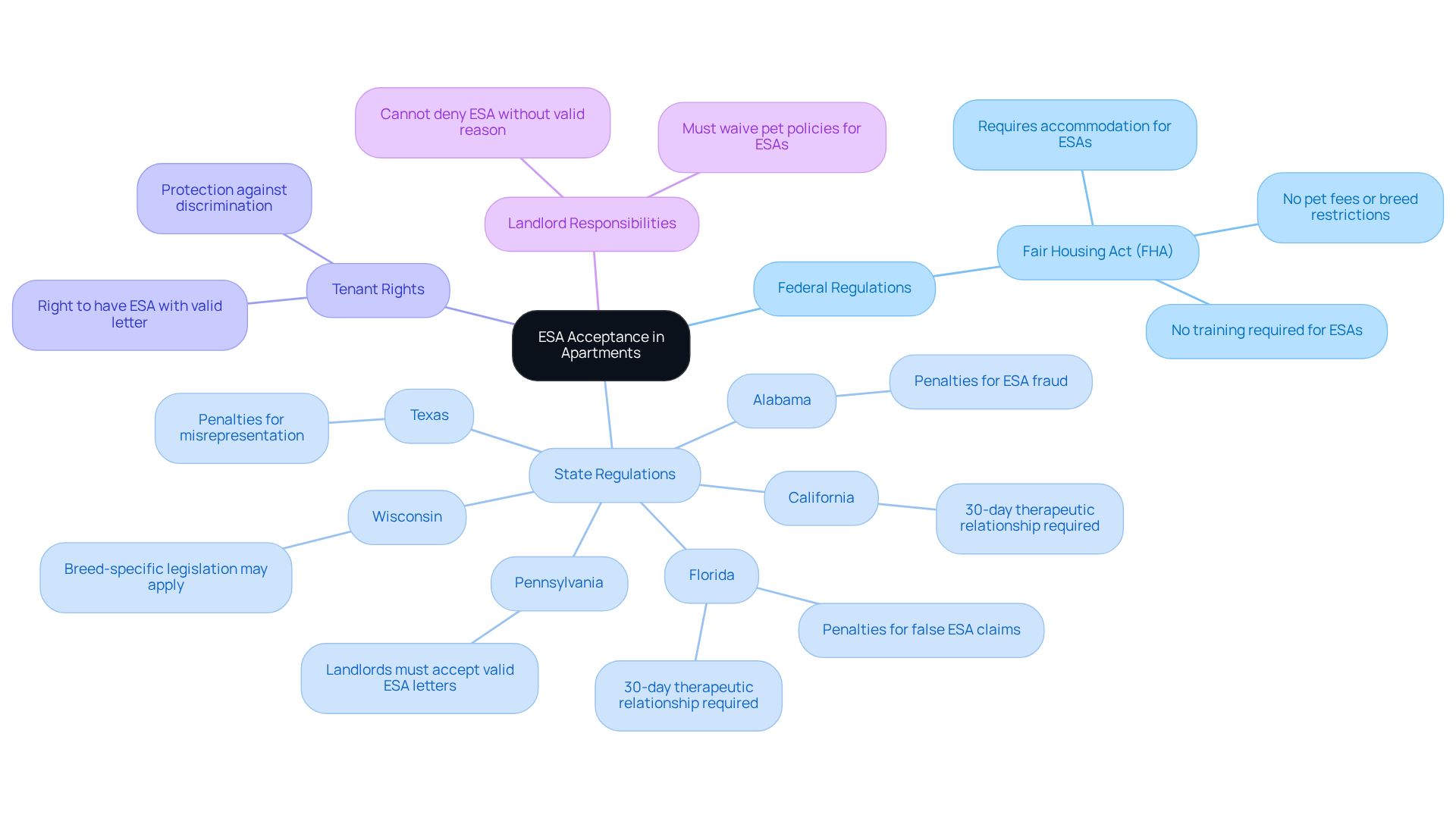
Considerations for Landlords Regarding Emotional Support Animals
Landlords should approach requests for emotional support animals (ESAs) with an open heart and a commitment to understanding their legal responsibilities under the Fair Housing Act. It is important to recognize that emotional support animals differ from service dogs; while ESAs provide emotional comfort to individuals with psychological or emotional disorders, they are not trained to perform specific tasks and do not have the same legal rights and access to public spaces as service dogs under the ADA. Familiarity with local laws regarding ESAs is crucial, as these regulations can vary significantly. By creating clear, documented guidelines for managing ESA requests, landlords not only protect their interests but also foster a supportive environment for residents in need.
Best practices for accommodating ESAs include:
- Clear Communication: Landlords should openly communicate their pet policies to prospective tenants, ensuring that any requirements for ESA documentation are clearly understood. Under the Fair Housing Act, landlords can require documentation even if a ‘no pets’ policy exists.
- Documentation Requirements: Acceptable documentation typically includes letters from licensed healthcare professionals that validate the need for an ESA. This documentation should be reviewed promptly to avoid unnecessary delays.
- Reasonable Accommodations: Landlords are required to make reasonable accommodations for ESAs, which may involve modifying existing pet policies or providing exceptions to ‘no pets’ rules.
- Respect for Common Areas: ESA owners must ensure their pets do not disturb other residents, maintaining cleanliness and minimizing noise disturbances.
- Awareness of Allergies and Fears: Landlords should consider the potential allergies or fears of other residents when accommodating ESAs, promoting a harmonious living environment.
Furthermore, landlords ought to recognize the importance of landlord insurance, which can protect against risks related to emotional support animals, including property damage and liability claims.
Examples of effective practices include documenting all agreements regarding ESAs in the lease and consulting with legal experts to navigate compliance with housing laws. It is also essential for landlords to understand the potential repercussions of how apartments can deny emotional support animals requests, such as the possibility of residents filing complaints with the Department of Housing and Urban Development. By adhering to these guidelines, landlords can reduce risks associated with property damage or disturbances while also considering if and how apartments can deny emotional support animals for tenants who rely on them.
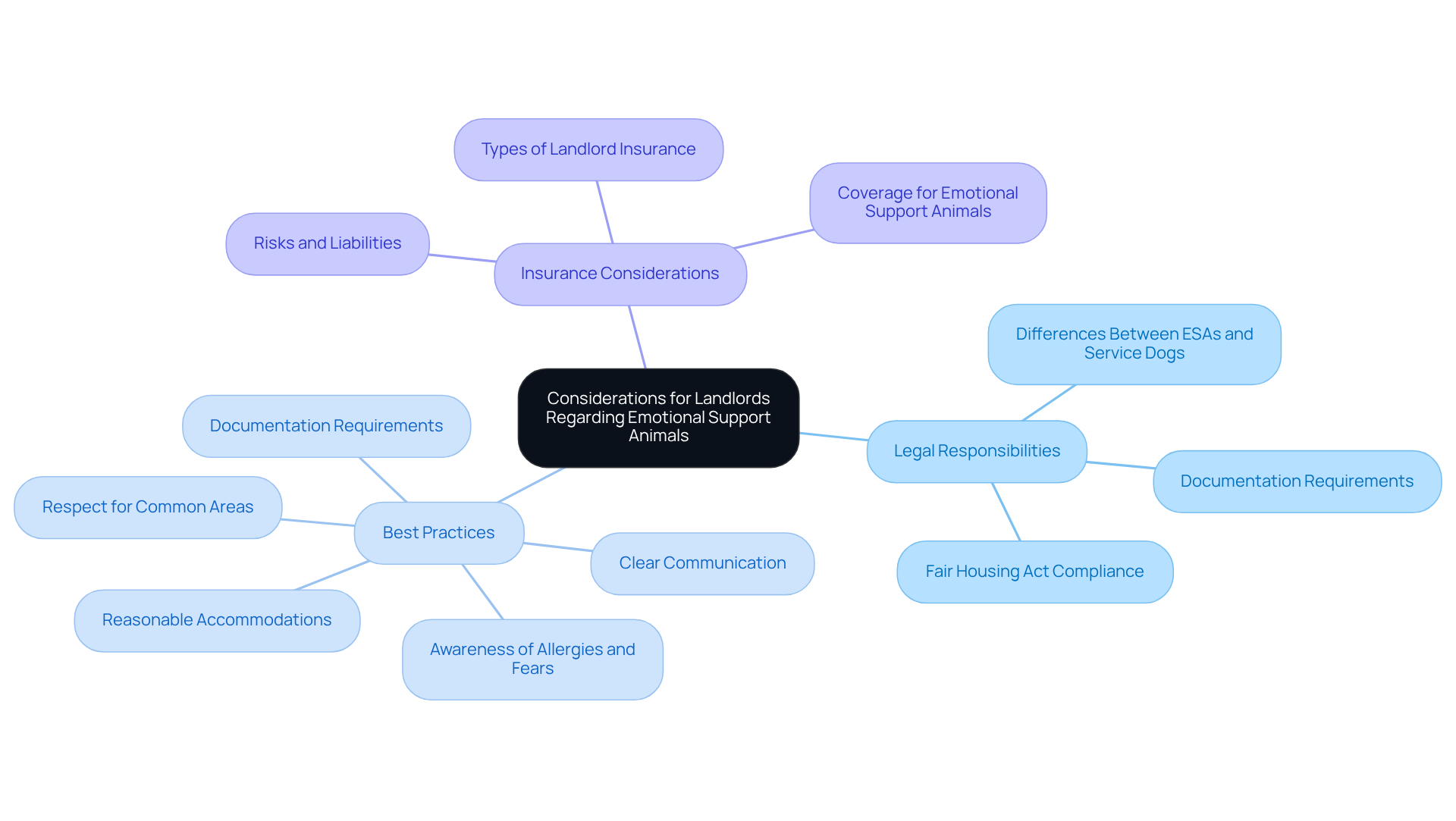
Conclusion
Understanding the dynamics surrounding emotional support animals (ESAs) is essential for both tenants and landlords. This situation can be challenging, as tenants have rights under the Fair Housing Act to live with their ESAs. However, there are valid reasons apartments may deny these requests. Insufficient documentation, safety concerns, and property damage are among the key factors that landlords can cite when refusing an ESA application. Clear communication and proper documentation are crucial in navigating these situations effectively.
In navigating the complexities of ESA requests, both tenants and landlords must be informed about their rights and responsibilities. Tenants should proactively gather necessary documents and be prepared to address any concerns, while landlords should establish clear policies and maintain open lines of communication. This mutual understanding fosters a supportive living environment that respects the emotional needs of residents while also addressing legitimate property concerns.
Ultimately, the significance of ESAs in enhancing emotional well-being cannot be overstated. Both parties are encouraged to engage in constructive dialogue to reach mutually beneficial agreements. By doing so, they can ensure that individuals who rely on emotional support animals receive the companionship they need while maintaining a harmonious living arrangement. Understanding local laws and best practices will empower tenants and landlords alike as they navigate the intricate landscape of emotional support animal policies.
Frequently Asked Questions
What services does Wellness Wag provide for obtaining an ESA letter?
Wellness Wag offers a streamlined platform to help individuals secure their Emotional Support Animal (ESA) letter quickly and efficiently through a short evaluation, personalized consultations, and thorough evaluations with licensed medical professionals.
How long does it take to receive an ESA letter from Wellness Wag?
Once approved, you can expect to receive your official ESA letter within 30 days after authorization.
What rights do tenants have under the Fair Housing Act (FHA) regarding ESAs?
Under the FHA, tenants with emotional support animals are protected from discrimination, meaning landlords cannot deny housing based on a resident’s need for an ESA, even in ‘no pets’ properties.
Can landlords impose fees or deposits for emotional support animals?
No, property owners are not permitted to impose fees or deposits for ESAs, allowing tenants to reside with their assistance animals without added financial strain.
What are some valid reasons for which an apartment may deny an ESA request?
Valid reasons for denial may include insufficient documentation, direct threats posed by the ESA, property damage caused by the animal, or concerns regarding the size or breed of the animal in relation to the living environment.
Why is proper documentation important when requesting an ESA?
Proper documentation, specifically a valid ESA letter from a licensed healthcare professional, is crucial as it outlines the necessity of the ESA for the individual’s mental health and can prevent denial of the request.
What should tenants do if their ESA request is denied?
Tenants should proactively gather all necessary documentation and be prepared to address any concerns their landlord may raise to advocate for their rights effectively.
Certify Your Emotional Support Animal Today

Why You Can Rely on Us?
At Wellness Wag, we believe your pet deserves care rooted in both science and compassion. Each article is carefully researched, written in clear language for pet owners, and then reviewed by qualified professionals to ensure the information is evidence-based, current, and practical for real-life care. Our goal is to help you feel confident in making informed decisions about your pet’s health and well-being.
Reviewed by
Angela Morris, MSW, LCSW
Angela is a licensed clinical social worker with 20 years of experience in patient advocacy and community mental health. She has assisted numerous clients with ESA evaluations and brings a deep understanding of disability accommodations, ensuring that all information is accurate, supportive, and practical.

Written by :
Lena Park
Last Updated :
September 16, 2025












